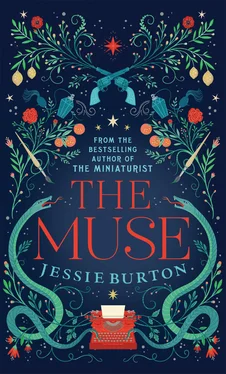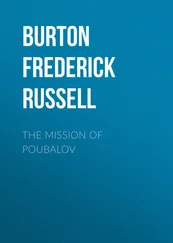‘London’s all right, I suppose,’ Olive said, intending to sound jokily arch. ‘The people can be ghastly.’ Her mother flashed her a look.
‘I have been to Barcelona many times,’ Isaac said. ‘And Madrid.’
Olive thought of their travelling trunks upstairs, the wooden brackets shiny from handling by so many porters, labels from Paris and Buenos Aires, Marseilles, New York; peeling like old skins the Schlosses had shed. She could barely remember any of it now, and nineteen felt like ninety.
‘But have you always lived in Arazuelo?’ Harold asked him.
‘Yes. I am a teacher in Malaga.’
‘What do you teach?’ Sarah asked.
‘Lithography,’ he said. ‘At the San Telmo School of Art.’ Olive stared hard at her plate.
‘Harold’s an art dealer,’ Sarah went on. ‘Kokoschka, Kirchner, Klimt, Klee — all his. I swear he only sells artists whose surnames start with a K.’
‘I admire Kokoschka,’ Isaac said, and Olive sensed her father become alert.
‘Herr Kokoschka painted blue fir trees in Olive’s nursery in Vienna,’ Sarah said. ‘Mr Robles, your English is excellent.’
‘Thank you, señora. I taught myself,’ he said. ‘I have English acquaintances in Malaga, and I practise with Teresa.’
‘Do you paint, or only print?’ asked Harold.
Robles hesitated. ‘I paint a little, señor.’
‘You should bring me some of your work.’
Generally, Harold was allergic to people who said they painted. Whenever a hopeful artist got wind that Harold was a dealer, they always misjudged it. Sometimes, they displayed aggression, as if Harold was withholding something to which they were specifically entitled — or they offered a simpering humility that fooled no one. But here was Herr Schloss, asking this young man for his work. Olive was used to how it was when Harold’s attention was caught — how he would dog, cajole, flatter, act the father, the pal — whatever it took, hoping he would be the one to uncover next year’s genius. It always hurt.
‘What I paint would not interest you, señor,’ said Isaac, smiling.
Harold tipped up the pitcher and poured himself a glass of water. ‘Let me be the judge of that.’
Isaac looked serious. ‘If I have the time, I will show you.’
‘The time?’ said Harold. Olive’s skin tingled.
‘When I am not at San Telmo, I am occupied with the workers’ union in Malaga. I teach them how to read and write.’
There was a pause. ‘Does your father know you’re a red?’ Sarah asked.
Isaac smiled again. ‘I am twenty-six, señora. I do as I must. I supported the workers’ strikes. I travelled to Asturias to help the miners. But I am not a red.’
‘Shame. That would have been exciting.’
Olive sat on her hands, staring at her mother. Sarah’s entire life was predicated on the docility of the workers who propped up her family’s famous condiment business. She saw herself as a free spirit, but it was the work of her great-grandfather — starting with his barrel of oranges in Covent Garden and ending up an industrialist with a seat in the Lords — that paid for their travel, the flat in Curzon Street, the cottage in Sussex, the house off the Ringstrasse, the Schiaparelli dresses. Harold’s business was certainly successful, but Sarah’s inheritance underwrote the lot.
‘You are who you are because of the very people you would never deign to consort with,’ Harold had once shouted at Sarah, after an evening when she hadn’t come home and he’d had to call the police. Sarah, who had in fact passed out on her host’s chaise longue and couldn’t be roused till the morning, had shouted back that he didn’t have a leg to stand on, because he too benefited directly from the family’s Finest Cut Marmalade, so he could shut his mouth, unless he fancied finding himself a proper job and a flat in Camden.
‘My father and I do not often agree,’ Isaac was saying. ‘He works for the duchess. All this land is hers. She is eighty-five years old and she won’t die.’
‘I’m going to be like that,’ said Sarah, and they all laughed.
‘The people who work her land — how do you say in English? — tienen un gran hambre —’
‘They’re starving,’ said Olive.
Isaac looked at her in surprise, and again Olive felt the current that ran through her, the thrill of his attention. ‘Yes,’ he said. ‘Thousands. Across the region.’
‘How terrible,’ said Sarah.
Olive willed Isaac to look at her again, but he leaned forward and spoke to her mother. ‘ La duquesa ’s men will give you a job, if you promise to vote for her family and keep her powerful. The poor beg to work her land, for almost nothing, because that is all the work. But she does not remember them if their wife dies, or if their mother is sick. If they are sick. She only shows her face during the time of election.’
Teresa appeared at the door of the dining room, and stood with her arms crossed. Her hair had frizzed from the kitchen’s steam, her apron covered in bloodied smears. Isaac looked up, seeming to hesitate. Olive noticed Teresa almost imperceptibly shake her head, as Isaac blinked away her warning and barrelled on.
‘My father finds her men to work her land,’ he said, ‘but he only picks the young men, the strong men, not the older ones with families. So more people are starving. And there is no rule on the price for your work here, so la duquesa pays you nearly nothing. We tried to change that in the last election, but it has been changed again. And if you complain about how little you get of the harvest — or how bad condition is your house — la duquesa and her people will hear. You will not work.’
‘But the church must help them,’ said Harold.
‘Shall I tell you a secret? They say that our Padre Lorenzo has a lover in the village of Esquinas.’
Sarah laughed. ‘It’s always the priest what done it.’
Isaac shrugged. ‘They say Padre Lorenzo wants to make private the fields between the church and the house of his lover, so no one can see him when he makes the journey.’
‘Is that a joke?’ asked Sarah.
‘Who knows, señora? Padre Lorenzo is the cousin of the duchess. He has more interest in territory maps than prayer books.’ He sighed, tapping the ash of his cigarette into the ashtray. ‘We had a vision. Land, church, army, education, labour — all to change. But we are — how do you say it? Cogidos ?’
‘Caught,’ said Olive, and Isaac looked at her again. She blushed. ‘You’re caught.’ She turned away, unable any longer to meet his eye.
‘Mr Robles isn’t caught ,’ Sarah said. ‘He speaks English. He’s been to Madrid.’
Isaac inhaled sharply on his cigarette. ‘Action may be the only answer, señora. We need the tyranny gone.’
‘Tyranny?’ said Sarah. ‘What tyranny?’
‘Most people here are just trying to plant their cabbages and eat them in peace,’ said Isaac. ‘But many of the children in Arazuelo do not even go to school because they are working in the fields. They need to know who’s pulling the sheep over their eyes.’
‘Wool,’ said Harold. He’d barely spoken, and they all looked at him as he reached into his pocket for his lighter and dipped his head to ignite his cigarette. ‘The word you mean is wool .’ Being Viennese, he pronounced it voohl .
‘Are you planning a revolution, Mr Robles?’ asked Sarah. ‘Perhaps we should call you Lenin.’
He held up his hands in surrender, laughing as he glanced at Olive once again. She could barely cope; he was looking at her this time because he wanted to, and she felt as if her head might be on fire. He was the most beautiful man she had ever seen. ‘You will see, señores,’ Isaac said. ‘You are new here, but you will see.’
Читать дальше












